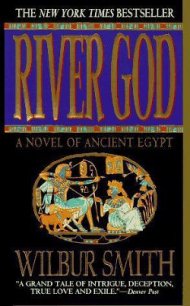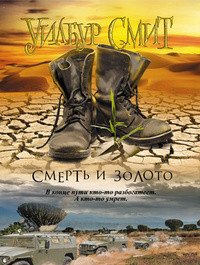Men of Men - Smith Wilbur (книги бесплатно без txt) 📗
Saala was playing outside the queen's hut, moulding little clay oxen and figures of men and women for Ningi.
Through the thatched wall she heard the queen giving her orders to the Black Ones. Frantic with terror for the safety of Lobengula, Saala ran to the other royal mothers.
"The Black ones are coming for the royal sons. You must hide them., Then Saala left little Ningi, now weaned and strong, with one of the royal women who was barren and childless.
"Look after her," she whispered, and ran out into the grasslands.
Lobengula was by now ten years of age, and was tending what remained of the royal herds: the duty of every Matabele boy, the essential service through which he learned the secrets of the veld and the ways of cattle, the nation's treasure.
Saala found him bringing in the herd to water. He was naked except for the little flap of leather over his loins, and armed only with two short fighting sticks with which he was expected to drive off any predator and to hold his owr. in competition with the other herd boys.
Holding hands again, the Matabele princeling and the little white girl fled, and instinctively they turned southwards, back the way they had come.
They lived on roots and berries, on the eggs of wild birds and the flesh of the iguana lizards. They competed with the jackals and vultures for the remains of the lion kill, and sometimes they went hungry, but at last they found themselves in the maze of the Matopos Hills where the Black Ones would not follow them. They slept under the single kaross that Saala had brought with her, and the nights crackled with frost so they slept in each other's arms, clinging together for warmth.
Early one morning the old man found them thus. He was thin and mad-looking, with strange charms and magical objects about his neck, and the children were terrified of him.
Saala pushed Lobengula behind her, and with a show of false courage faced the wizard.
"This is Lobengula. Favourite son of Mzilikazi," she declared stoutly. "Who harms him, harms the king."
The old man rolled his mad eyes, and drooled horribly as he grinned with toothless gums. Then suddenly the air was full of the sound of ghost voices, and Saala.
screamed and Lobengula wailed with terror, and they clung to each other pitifully.
The wizard led the children, chastened, shivering and weeping, through secret passages and over precipitous trails, deeper and deeper into the hills, until at last they came to the caves which honeycombed the rock.
Here the old man began the instruction of the boy who would be king. He taught him many of the mysteries, but not how to control the ghost voices, nor how to throw fire by pointing his finger, nor how to see the future in a calabash of mountain water.
Here in the caves of the Matopos, Lobengula learned the scope and power of the magical order. He learned how the little wizards, the witchdoctors, were spread across the land, performing the small rites, making rain and giving charms for fertility and childbirth, smelling out the evil-doers, and sending back their reports to the cave in the Matopos.
Here the grand wizards, of which the old man was one, worked the great magics, called up the spirits of their ancestors, and looked into the mists of time to see what the future would bring. Above them all was the Umlimo.
It was a name only for Lobengula, Umlimo, a name that even after he had lived five years in the cave could still make him shiver and sweat.
Then when he was sixteen, the mad old wizard took him to the cave of the Umlimo. And the Umlimo was a woman, a beautiful woman.
What Lobengula saw in the cave of the Umlimo he would never speak about, not even to Saala, but when he came back from the cave there was a sadness in his eyes, and the weight of knowledge seemed to bow his young shoulders.
There was a furious thunderstorm the night of Lobengula's return, and the blue lightning clanged upon the anvil of the hills with strokes that tortured their eardrums as they lay together under the kaross. Then it was that the little orphan white girl made the boy into a man, the princeling into a king; and when her term was run she gave him a son who was the colour of the early morning sunlight on the yellow winter grass, and Lobengula knew happiness for the only time in his life.
In their joy they paid little attention to tidings which the mad old wizard brought to their cave.
He told them how Mzilikazi, great with plunder, fat with cattle, had come back to Thabas Indunas, arriving suddenly with the blood barely dried on the spears of his impi, and red rage in his art.
At Mzilikazi's nod the Black Ones gathered all those who had acted as if the king were dead. Some they hurled from the cliff of execution, some they pegged down upon the sandbanks of the river where the crocodiles sunned themselves, others they skewered with bamboo spikes through the secret openings of their bodies.
But when the mother of Nkulumane was led before the king, she wept so and tore her own flesh with her nails while she called on all the spirits of the dead to witness how faithful she had been to Mzilikazi in his absence, how constant had been her belief in his eventual safe return and how during his absence she had guarded the other royal sons from the Black Ones and even sent Lobengula into the wilderness to save him so that Mzilikazi, who at the bottom was only a man, believed her. However, the others died in their hundreds, victims of the king's wrath, and the nation rejoiced for the king had returned and the good old days were back.
Through all this Lobengula and Saala and their little yellow son stayed on in the cave of the Matopos and knew happiness.
Far away in the south below the Limpopo river, a Hottentot elephant hunter stopped to water his horse at the well beside a Boer homestead that stood not far from the battlefield where the Boer horsemen had long ago first defeated Mzilikazi before driving him out of this country.
"I saw a curious thing" said the Hottentot to the big, solemn, bearded man who was his host. "In the southern hills of Matabeleland, I saw a white woman, full grown and naked. She was shy as a wild buck and ran into the rocky ground where I could not follow her."
Two months later, when the Boer farmer took his family into the service of Nachtmaal in the new church at Rustenberg, he repeated the strange story which the Hottentot hunter had brought from the north. Someone recalled the story of the massacre of the Van Heerden family, and the two little girls, Sarah and Hannah, taken by the murderous plundering savages.
Then Hendrik Potgieter, that doughty trekker and kaffir-fighter, stood up in the pulpit, and thundered: "The heathen have a Christian woman as captive!" And the words offended much that the congregation held dear: God and their womankind.
"Commando!" roared Hendrik Potgieter. "I call commando!"
The women filled the powder-horns and Poured the lead into the bullet moulds, and the men picked out their best horses and elected Potgieter as their leader.
Not all of it was for God and womankind; for one whispered to another, "Even if there is no white woman, I have heard that there are fine new herds in Matabeleland."
Then the old wizard came to Lobengula's cave and rolled his eyes and cackled.
The buni have crossed the river of crocodiles, riding on the backs of strange beasts. Many men, many men!"
Instinctively Lobengula knew why the Boer commando was coming, and he knew also what to do about it. "Stay here, with the child," he ordered Saala. "I am going to my father's kraal, and I will lead his impis back here."
But Saala was a woman, with a woman's curiosity, and blood called to blood. Vaguely she remembered that these strange white men had once been her kin.




